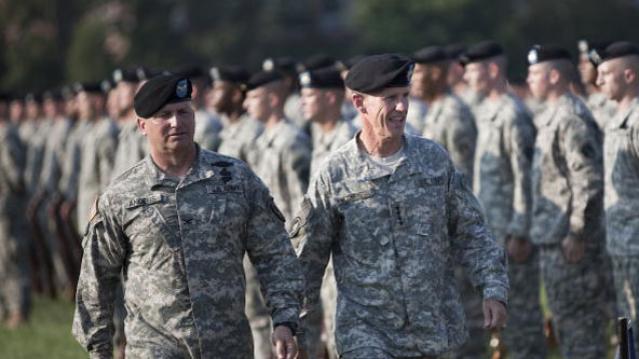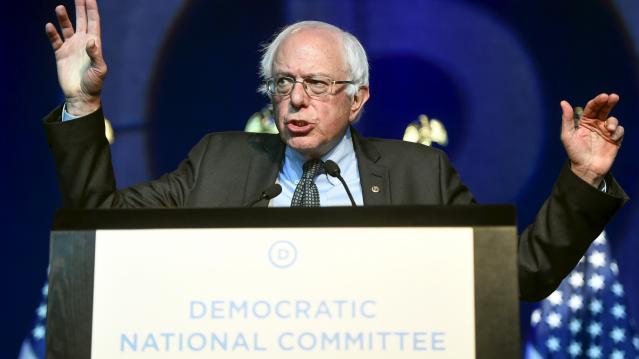Obama Faces Widespread Public Distrust on Iran Deal
President Obama will try to drum up support for the U.S.-Iran nuclear deal Wednesday afternoon at a news conference. But with widespread public disdain and distrust of Iran, Obama may have trouble convincing Americans of the wisdom of dealing with a long-time arch enemy in the Middle East.
The U.S. and Iran on Tuesday announced an agreement that would potentially block Iran’s development of a nuclear weapon for at least a decade while lifting international economic sanctions against Tehran. However, a new AP-GfK poll that was conducted just ahead of the announcement found that Americans only narrowly back diplomatic relations with the hardline Islamic government, and many want to see the sanctions kept in place.
Related: The 8 Most Important Things to Know About the Iran Nuclear Deal
Just 51 percent of those interviewed said the U.S. should have diplomatic relations with Iran while 45 percent said it shouldn’t. At the same time, 77 percent of those interviewed said the harsh U.S. and international economic sanctions against Iran should be preserved at current levels or even increased.
Only 12 percent of those interviewed thought sanctions should be decreased and seven percent said they should be eliminated altogether.
The public’s wariness and distrust of dating back to the 1979 Iranian revolution and U.S. hostage crisis matches the reception the nuclear agreement has received on Capitol Hill where most Republicans and some Democrats say they fear Obama has conceded too much to a country that has fomented terrorist activities throughout the Middle East and has repeatedly vowed to destroy Israel.
Fifty-six percent of Americans consider Iran to be an enemy, according to the poll conducted last Thursday through Monday, while an additional 31 percent consider Iran to be unfriendly but not an enemy. More than 70 percent of Republicans, half of all independents and 45 percent of Democrats described Iran as the enemy.
Related: Clinton Cautious in Her Praise of a Nuclear Deal She Helped to Orchestrate
Before the agreement was announced, six in ten Americans said they disapproved of Obama's handling of the U.S. relationship with Iran, while just over a third approved.
Obama is likely to prevail in pushing the nuclear non-proliferation agreement through Congress over the next two months, despite near-unanimous opposition from Senate Majority Leader Mitch McConnell, House Speaker John Boehner and other leaders and rank and file Republicans. Still, he will need to hold in place at least 34 of the 46 Democrats in the Senate to create a veto-proof firewall in the event Republicans push through a resolution of disapproval of the nuclear deal.
That means that Obama cannot afford any more than 12 Democratic defections to keep the agreement alive. Yesterday, Obama and Vice President Joe Biden began working the phones to shore up support on Capitol Hill, and the president will continue that effort during this afternoon’s White House press conference.
During an interview yesterday with Tom Friedman of The New York Times, Obama stressed that the deal prevented a pathway for Iran to develop a nuclear weapon while making it clear he shared Americans’ distrust of the Iranian government and had limited expectations of improved relations down the road.
Related: Iran Agrees to Limit Nuclear Weapon in Historic Deal
When announcing the deal yesterday, Obama said, “This deal is not built on trust -- it's built on verification…. We will, for the first time, be in a position to verify that Iran is meeting all of these commitments. International nuclear inspectors will have access to Iran's nuclear program -- where necessary, when necessary. This is the most comprehensive and intrusive verification regime that we have ever negotiated. If Iran tries to divert raw materials to covert facilities, inspectors will be able to access any suspicious locations.”
The 15 Most Valuable NFL Teams

The New England Patriots may be reigning Super Bowl champs and have the most successful quarterback-coach pair in NFL history -- Tom Brady and Bill Belichick each have four championship rings with the Pats -- but they’re missing something nevertheless.
As they kick off the season tonight against the Pittsburgh Steelers, the Pats aren’t at the top of the NFL in terms of team value. That title still goes to the Dallas Cowboys, according to an analysis at Forbes.
Related: 10 Big Money NFL Draft Busts
Dallas must be feeling pretty good about beating New England at something. They had the same regular season record as the Patriots last year, with 12 wins and 4 losses, but ended the season with a loss to the Green Bay Packers in the divisional playoffs, while the Pats went on to win Super Bowl XLIX (that’s 49 for all you non-Romans out there).
Even though the Washington Redskins have been playing pretty pathetically for the past decade, they still come in third. Washington’s NFC East rival, the New York Giants, rank fourth at $2.1 billion.
Here are the 15 most valuable NFL teams:
- Dallas Cowboys - $3.2 billion
- New England Patriots - $2.6 billion
- Washington Redskins - $2.4 billion
- New York Giants - $2.1 billion
- Houston Texans - $1.85 billion
- New York Jets - $1.8 billion
- Philadelphia Eagles - $1.75 billion
- Chicago Bears - $1.7 billion
- San Francisco 49ers - $1.6 billion
- Baltimore Ravens - $1.5 billion
- Denver Broncos - $1.45 billion
- Indianapolis Colts - $1.4 billion
- Green Bay Packers - $1.38 billion
- Pittsburgh Steelers - $1.35 billion
- Seattle Seahawks - $1.33 billion
Top Reads from the Fiscal Times:
- After the Fiorina Fiasco, What Insult Will Trump Fling Next?
- $42 Million for 54 Recruits? U.S. Program to Train Syrian Rebels Is a Disaster
- A Military Coup in the U.S.? A Surprising Number of Americans Might Support One
A Military Coup in the U.S.? A Surprising Number of Americans Might Support One

Imagine you’re watching the evening news, kicking back after a long day in the cubicle. Suddenly a breaking news alert flashes across the screen: “Military Coup Overthrows the Government.” What would be your reaction?
While most Americans say they can’t imagine supporting a takeover of the government by the armed forces, or least aren’t sure about it, a substantial number of people say they can imagine supporting the military in such a scenario.
In a new survey by YouGov, 29 percent of respondents said they can imagine a situation in which they would support the military taking control of the federal government – that translates into over 70 million American adults. Forty-one percent of respondents said could not imagine supporting the military taking over the country.
Related: With $8.5 Trillion Unaccounted for, Why should Congress Increase the Defense Budget?
Republicans (43 percent) were more likely to say they can envision a scenario in which they could support a military coup than Democrats (20 percent). Perhaps that difference is related to having a Democratic president who some critics on the right see as overstepping his power.
Regardless of political ideology, one reason people might support a military coup is because they respect officers in the military far more than they do people in Congress. According to the same YouGov survey, almost three-quarters (70 percent) of respondents believe that military officers want what is best for the country, while only 29 percent think the same of members of Congress.
Lawmakers better shape up or they might be shipped out -- literally.

Top Reads From The Fiscal Times
- A Conservative Rebellion is Brewing on Capitol Hill
- 9 ISIS Weapons That Will Shock You
- There’s Only One Candidate People Actually Like – and It’s Not Trump or Clinton
Sanders Pulls Ahead in Iowa, but a Tougher Clinton Aims to Even the Score

A new poll unveiled Thursday finds populist Bernie Sanders squeezing past Hillary Clinton for the first time as the preferred choice among likely Iowa caucus-goers.
The survey by Quinnipiac University shows the Vermont lawmaker receiving 41 percent, while Clinton garnered 40 percent. The figures put Sanders’ lead well within the poll’s 3.4 percent margin of error, but the numbers serve as another indication of how tight the Democratic primary has become, especially in Iowa where Clinton has long maintained an advantage.
Related: With Trump and Sanders Riding High, How Low Will Bush and Clinton Go?
The poll found another 12 percent of voters would support Vice President Joe Biden, who has yet to decide if he will enter the 2016 race. Former Maryland Governor Martin O’Malley received 3 percent, and the same number were undecided.
While many could view the survey as the latest sign Clinton’s campaign is flailing, the timing of the poll could prove crucial.
The study was conducted between August 27 and September 8. That was the same day the former secretary of State told ABC News that using a personal email account while in office was a mistake and that she is sorry for it.
Related: Hillary’s E-Mail Lapse ... Mistake ... Responsibility ... er, 'Apology'
“I do think I could have and should have done a better job answering questions earlier. I really didn’t perhaps appreciate the need to do that,” Clinton said. “What I had done was allowed, it was above board. But in retrospect, as I look back at it now, even though it was allowed, I should have used two accounts. One for personal, one for work-related emails. That was a mistake. I’m sorry about that. I take responsibility.”
The interview marked the first time she apologized for her unique email arrangement. Questions over Clinton’s use of a private server have dogged her candidacy since she entered the White House race earlier this year.
Republicans have used the controversy surrounding the server to paint Clinton as untrustworthy and unfit to serve in the White House.
Related: Clinton: Trump Is Bad for American Politics
Indeed, Thursday’s poll found that while Clinton is still liked among Democratic voters who believe she would make a good leader, Sanders fares better on the question of trustworthiness.
The Quinnipiac poll also closed before Clinton gave a muscular foreign policy speech at the Brookings Institution on, among other things, the Iran nuclear deal.
“We should anticipate that Iran will test the next president,” she said. “They'll want to see how far they can bend the rules.”
“That won't work if I'm in the White House. I'll hold the line against Iranian noncompliance,” Clinton added.
On the softer side of things, Clinton’s interview on “The Ellen DeGeneres Show” will air Thursday afternoon. The appearance will give her a chance to connect with female voters who are the backbone of her support.
Taken together, the various actions could put Clinton back atop the polls, at least in Iowa, and help her gain back ground she lost to Sanders in New Hampshire as well.
Top Reads From The Fiscal Times:
- House GOP Scores a Major Win in Obamacare Legal Challenge
- Hillary’s E-Mail Lapse ... Mistake ... Responsibility ... er, 'Apology'
- How Can You Tell There Are Russian Troops in Syria? Just Look for Some Soldier Selfies
College Students Say They’re Good with Money. Do You Believe Them?

A new study confirms it: College students think they know everything, at least when it comes to personal finance.
Nearly 60 percent of college students said that they had good or excellent financial literacy skills, according to a study released today by the American Institute of CPAs.
Despite that confidence, less than half of students say they stick to a monthly budget, nearly 40 percent had borrowed money from friends or family and more than 10 percent had missed a bill payment.
Of those surveyed, 99 percent said that personal financial management skills were important, but only a quarter said they seek out information on personal finance and incorporate it into their spending and saving habits.
“For many students, college is their first time making financial decisions,” Ernie Almonte, chairman of the AICPA’s Financial Literacy Commission said in a statement. “With this opportunity comes serious responsibility, and if they aren’t making informed, intelligent decisions it can have a negative impact on the rest of their financial lives.”
College students without a strong foundation in personal finance are more likely to take on risky debt or make poor saving decisions. But most students aren’t getting the education they need before they get to campus.
Just 17 states require high school students take a personal finance course, and only six require testing of personal finance concepts, according to the Council for Economic Education. Three out of four American teens can’t even make sense of a paystub.
But hey, at least they’re confident.
Top Reads from The Fiscal Times:
- House GOP Scores a Major Win in Obamacare Legal Challenge
- Hillary’s E-Mail Lapse ... Mistake ... Responsibility ... er, 'Apology'
- How Can You Tell There Are Russian Troops in Syria? Just Look for Some Soldier Selfies
How Can You Tell There Are Russian Troops in Syria? Just Look for Some Soldier Selfies

Although Russian President Vladimir Putin has denied that he is sending troops to Syria, selfies taken by Russian soldiers and posted on social media are telling a different story.
Russian investigative journalist Ruslan Leviev reports that an increasing number of experienced Russian troops have been deployed to a naval maintenance facility in Tartus, along Syria’s Mediterranean coast. His source? Status updates and photos posted on Russia’s two biggest social networking sites by members of the 810th marine brigade, an infantry force in the Russian navy.
Related: As Putin Targets Dissent, U.S. Democracy Group Banned in Russia
One photo Leviev found is of a career soldier named Mazhnikov, who appears to be at the naval facility in Syria. Another soldier, Anatoly Golota, also a member of the 810th brigade, updated his status on the Russian version of Facebook with the words, “Off to Syria :)).”
Russia has not denied that it’s been supplying weapons to the Syrian government and helping train the Syrian military. But Putin knows that combat troops are a different story.
The naval maintenance facility at Tartus is small, and in the past has been manned by just a handful of personnel. Leviev reports that the number of troops stationed at the facility is growing, and the troops are experienced contract soldiers, not draftees.
Videos uploaded to social media sites have raised concerns that Russian troops might be involved in combat inside Syria, according to an article in Foreign Policy. However, beyond the footage, which shows a Russian-made BTR-82A armored vehicle firing its gun in Syria, no other substantial evidence of active combat involving Russian troops has been found.
While the marines may or may not be directly involved in the fighting, the presence of Russian troops in Syria shows how hard Putin is pressing for a victory by the Assad regime. Now if he can just teach his soldiers how to avoid giving themselves away on social media.
Top Reads From The Fiscal Times
- Putin’s Economy May Be in Even Worse Shape Than It Looks
- China Sends a Message with Its New ‘Carrier Killer Missile
- In Showing Off Physical Strength, Putin Tries to Hide Political Weaknesses
